Giant bluefin tuna return in Wales a 'massive opportunity'
- Published
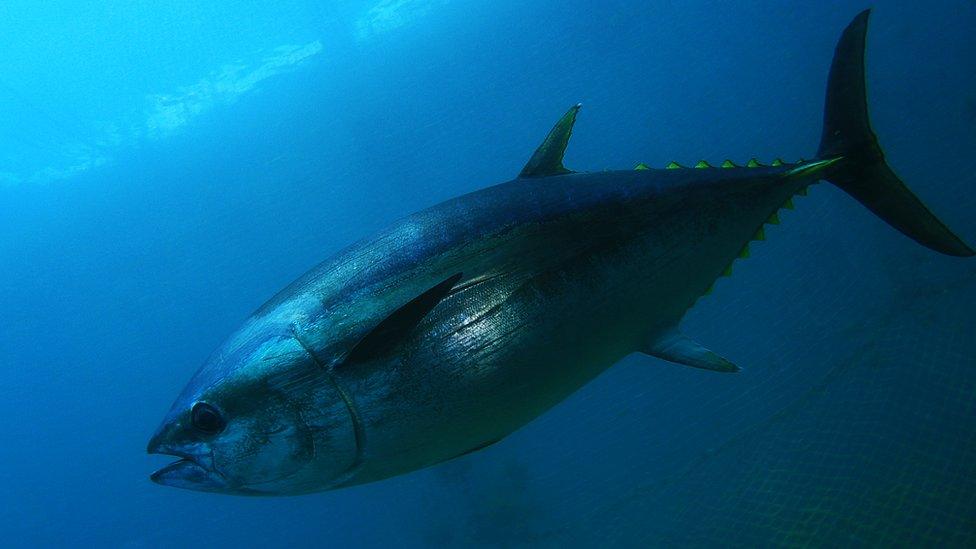
The Atlantic bluefin tuna is one of the fastest fish in the world and can reach speeds of more than 40mph
The return of giant bluefin tuna to waters off the Welsh coast presents a "massive opportunity" for science and tourism, fishing groups have said.
The fish disappeared from UK waters during the 1960s due to commercial overfishing and a changing climate.
But they are returning, including off the coast of Pembrokeshire, and fishing groups want to catch, tag and release a limited number.
The Welsh government said it was part of UK-level discussions on the issue.
Fishing groups have warned Wales risks "missing the boat" if action is not taken quickly, but the Wildlife Trusts have urged caution.
'World class'
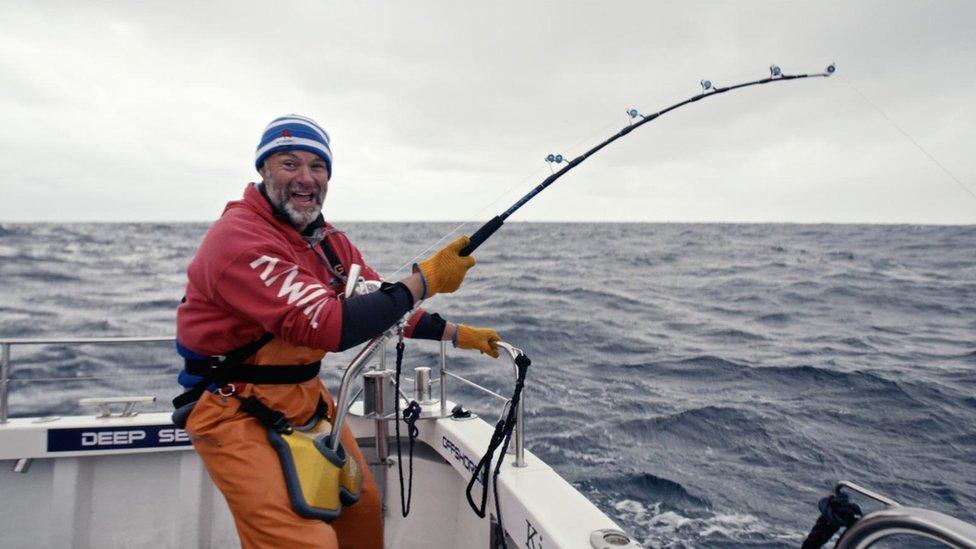
"Some of the biggest tuna in the world" are living 10 miles off the Welsh coast, says actor and keen angler Julian Lewis Jones
Famed for their size and speed in the water, the Atlantic bluefin tuna, also known as the giant bluefin tuna, have been spotted in large numbers over the past decade between the months of July and December.
They can grow to an average 6.5 feet (1.98m) long and can weigh up to 550lbs (249kg).
Julian Lewis Jones, known for his acting roles in films such as Invictus and Justice League, and patron of the Welsh Federation of Sea Anglers, said there was the potential for a "world class" recreational catch and release tuna fishery in Wales.
"Being a mad keen fisherman myself I know what lengths people will go to see their dream fish," Mr Jones said.
"And these are huge - some of the biggest tuna in the world - just 10 miles off the Welsh coast."
Mr Jones said a tuna fishery would attract anglers from around the world, adding: "It's a massive opportunity - we've had a terrible year with Covid and tourism has really suffered in our coastal communities."
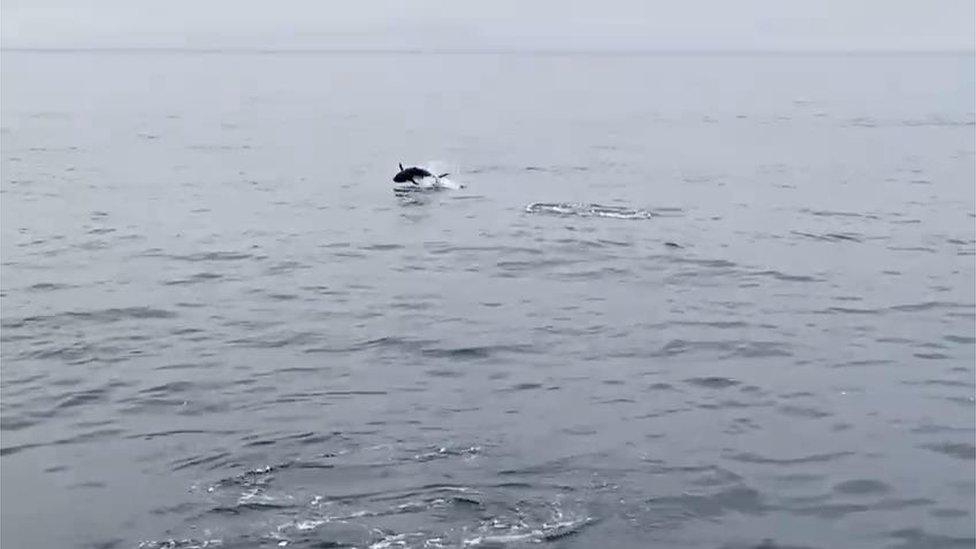
Fishing groups want to work alongside scientists to catch, tag and release a small number of fish
The first step, Mr Jones explained, would be to set up a catch and release tagging programme, known as a Chart, where anglers working as part of a scientific study would be able to catch, tag and release a small number of fish.
But he warned Wales was lagging behind the rest of the UK, with hopes of an announcement in England "within weeks" and Scotland having already earmarked funding.
Ireland has been running a Chart scheme for more than two years.
The UK government's Department for Environment, Food and Rural Affairs (Defra) has been leading a public consultation on the issue and could decide to allocate a share of the small quota the UK has for bluefin tuna to the UK nations.
But it would be down to the Welsh government after May's Senedd election to decide what to do next.
If Wales is to secure a Chart programme for this year's tuna season, it would have to happen soon so skippers can receive the necessary training and bring a university on board to manage the scientific study.
"If we aren't up to speed we will lose our chance," Mr Jones continued.
"If we're not in a position to be able to have those skippers ready in time for the season then it isn't going to happen for Wales, and that would be a travesty."
'Tuna is king'
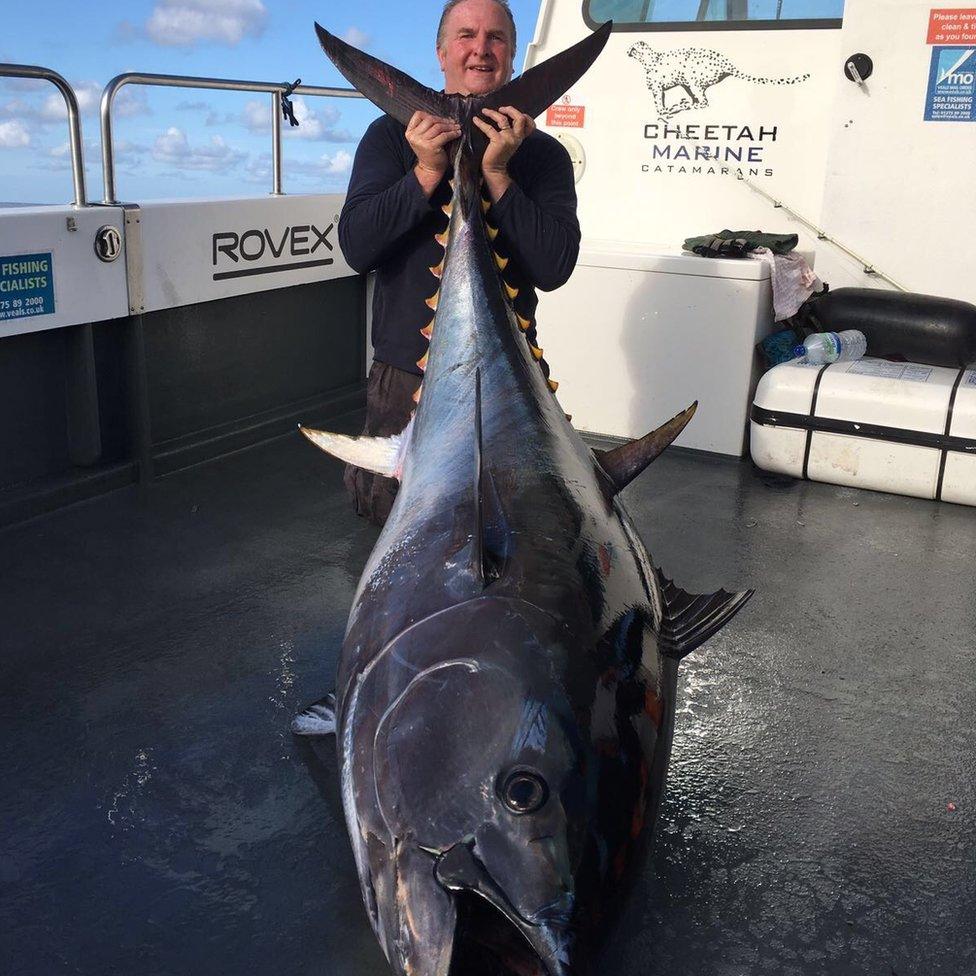
Andrew Alsop accidentally caught a giant bluefin tuna off the Pembrokeshire coast in 2017, and put it back in the sea
Andrew Alsop, who runs White Water Charters from Neyland marina in Pembrokeshire, accidentally reeled in a "monster" tuna - weighing about 500lb (226kg) and 7ft 7in (2.3m) in length - while fishing in 2017.
He said he first started to spot shoals of the fish back in 2012, describing it as an "amazing sight that you'd usually have to go abroad to Africa or America to see".
Since then he has been involved in the UK Thunnus Programme, external, which was tasked with understanding more about the recovery in tuna numbers here.
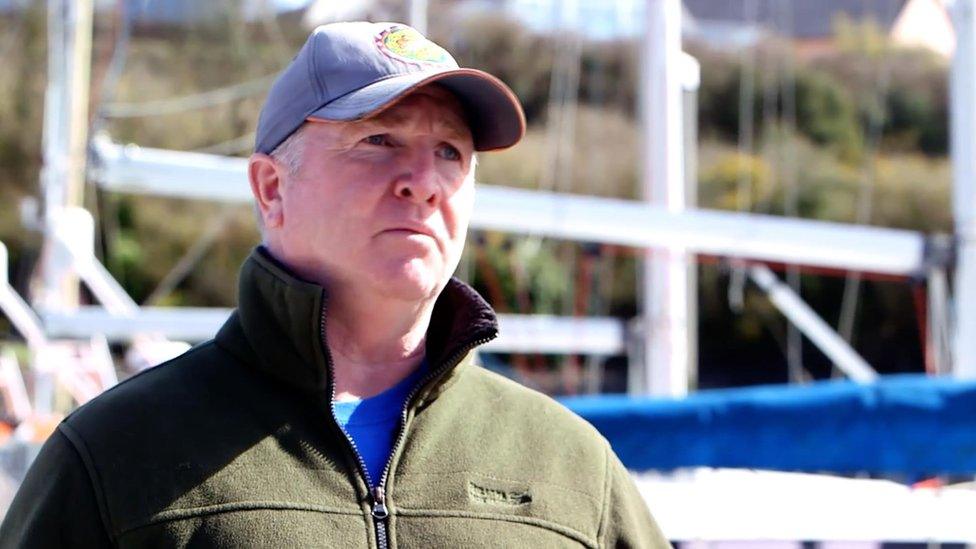
A tuna fishery off the Welsh coast would benefit the economy and aid scientific research, says Andrew Alsop
He said it would be a "kick in the teeth" if further research programmes were to take off across the UK but not in Wales.
"It needs to be done properly and anglers do need to know what they're doing - you can't just go out there like in the Jaws film," he said.
"We'd be working with scientists, monitoring these fish and the universities would benefit as they'd get a massive study."
He also pointed out that the tuna season runs into autumn and winter - the time of year when the west Wales economy could do with a tourism boost.
"My boat already brings in guys from Norway and America as it is. But tuna is king - people travel all over the world for it."
'Magnificent animals'
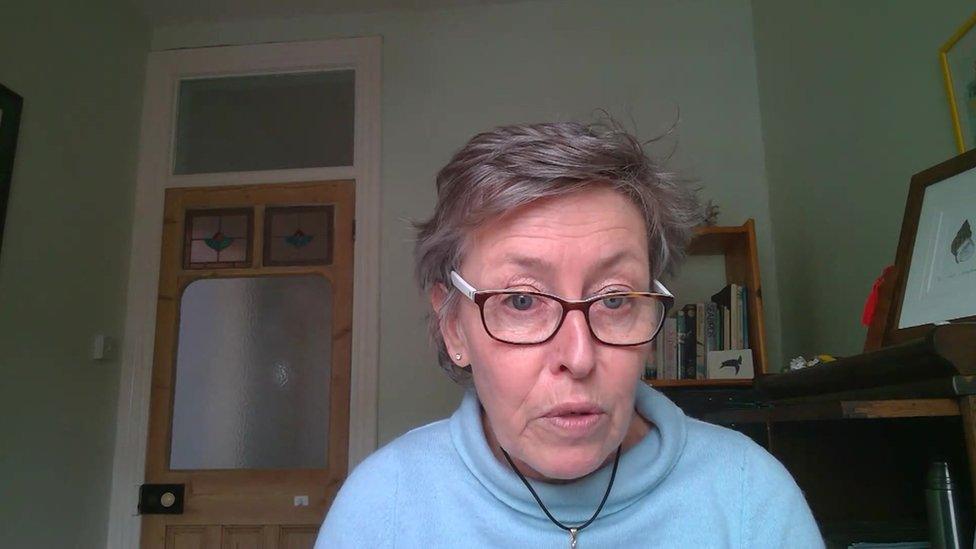
Joan Edwards, of the Wildlife Trusts, says bluefin tuna should not be caught
Joan Edwards, policy director for the Wildlife Trusts, said it was right for governments to proceed with caution.
"I do have my concerns - in the last 50 to 60 years we've lost 80% of the bluefin tuna in the Atlantic and we're now just starting to see them reappear in our waters," she said.
"I'm sure it's very exciting to land such a fish but [we should consider] the trauma that fish is going to go through.
"I just feel that we've got some recovery happening in our marine environment and that's something to celebrate - I don't think we should be catching them."
What do the political parties say?
Plaid Cymru said it had already written to Welsh Labour ministers urging them to "engage with the process fully" and "make sure we don't get left behind".
The Welsh Conservatives said while they were "broadly in favour of tagging for research, these decisions should always be led by the data and interested parties should be consulted on potential options".
The Welsh Liberal Democrats said fishing was "vital to the Welsh economy and the next Welsh government must do everything in its power to ensure the industry is able to stay afloat", adding Wales was in danger of being "left behind".
A spokesman for the Labour-run Welsh Government said it "was engaged with Phase 2 of the Defra-led UK Bluefin Tuna Catch and Release Tagging (Chart) project".

KEEPING FAITH: Binge-watch the the third and final series
LAND OF THE WILD: SECRETS: Explore the hidden world of Welsh wildlife like never before

- Published6 August 2020
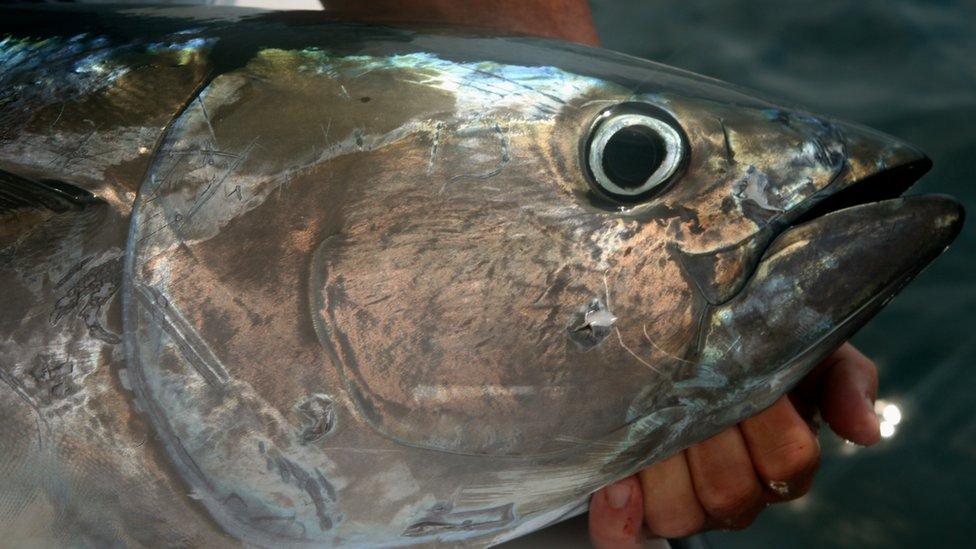
- Published2 September 2017
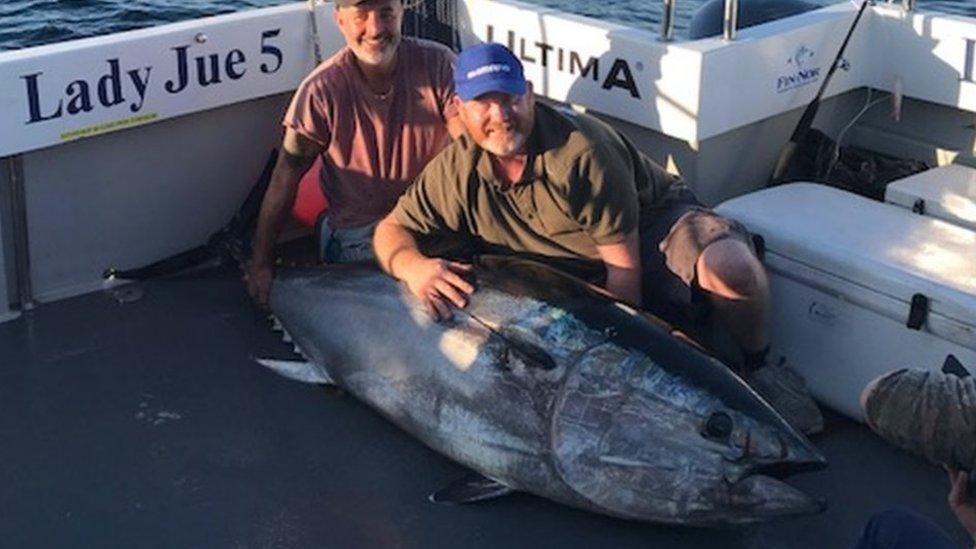
- Published7 March 2012